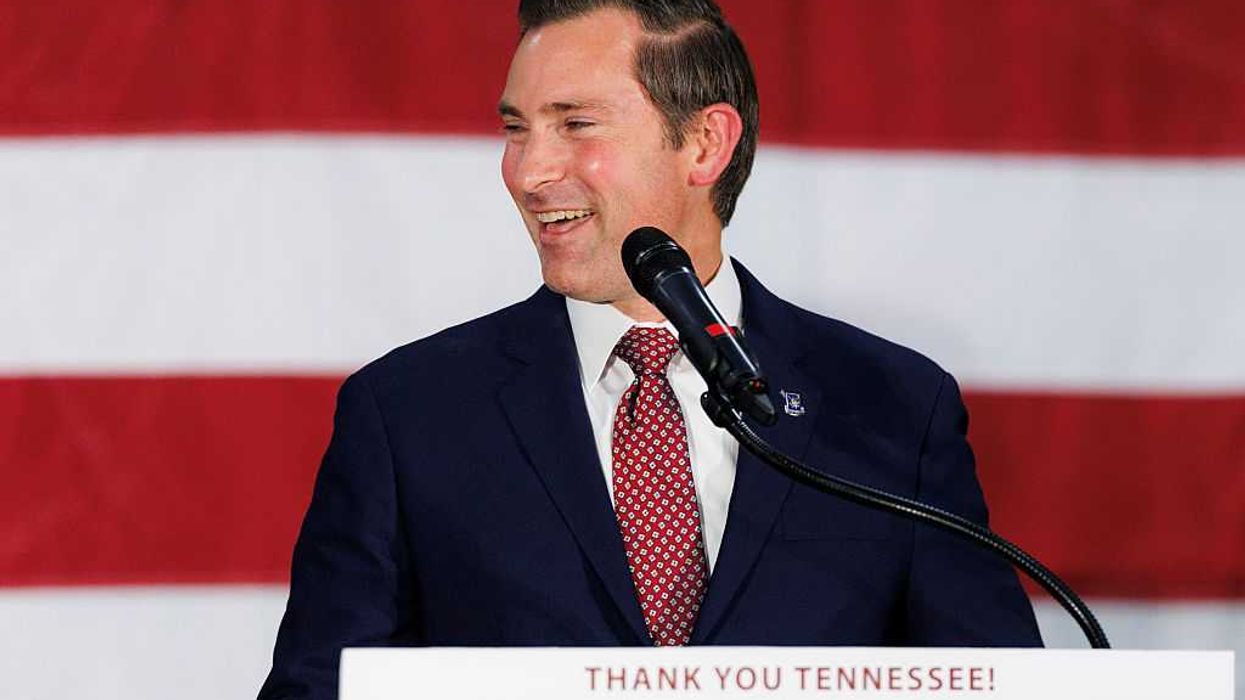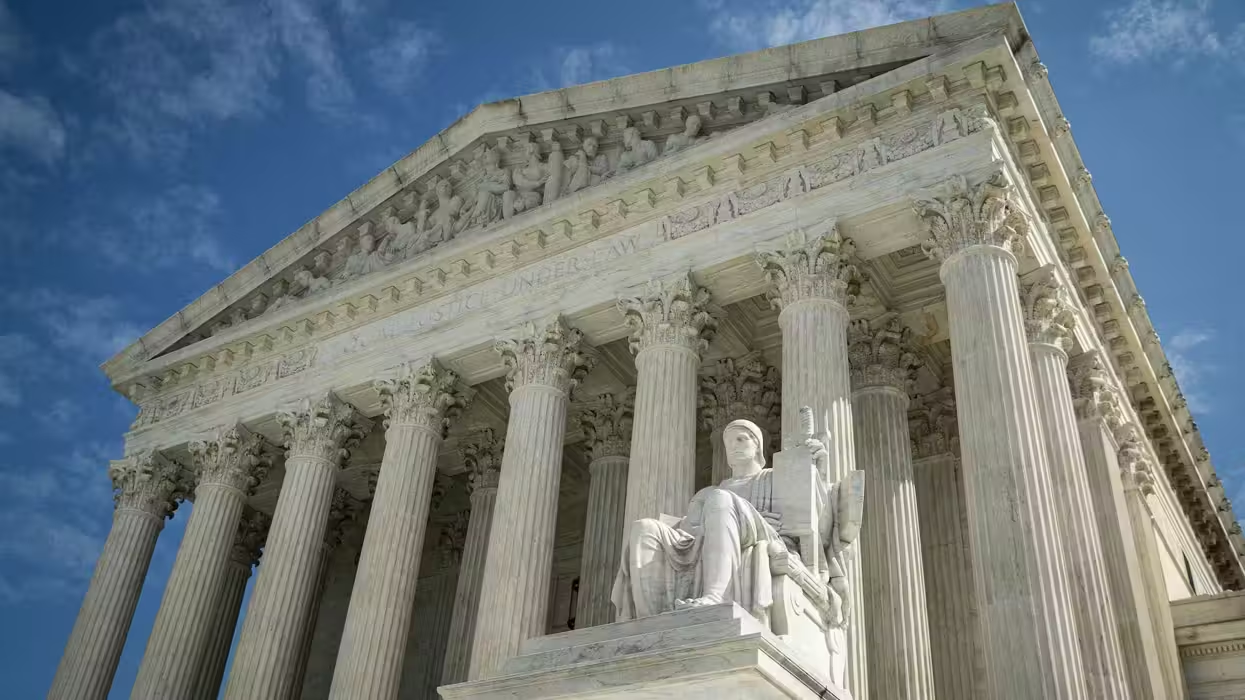
© 2025 Blaze Media LLC. All rights reserved.
Dinesh D'Souza explains the one great failure of the 'greatest generation' -- and how it led to America's transformation
June 02, 2014
A Blaze Books exclusive excerpt from the new book on which his upcoming movie will be based, Dinesh D'Souza's 'America: Imagine a World Without Her.'

Dinesh D'Souza's new book, "America: Imagine a World without Her," on which his upcoming movie of the same name will be based, is out today.
Below is an excerpt in which D'Souza explains his theory that the fundamental war that will determine America's future is between the American spirit during the tumult of 1968, and the American spirit at America's founding in 1776.
The dividing line between these two core ideologies in his view is embodied by the children of the "greatest generation," and the members of the "greatest generation" themselves.
According to D'Souza, the victors of this ideological battle will determine whether the country survives and thrives, or instead commits national suicide.
How did we get the 1960s? One is tempted to locate the ideological roots of this era in the 1930s. The expansion of the welfare state that President Lyndon Johnson termed the Great Society seems to have originated in President Franklin Roosevelt’s New Deal three decades earlier. It is true that FDR made some radical speeches that repudiate the principles of the founding. While the Founders considered the government to be the enemy of rights—several provisions of the Bill of Rights begin, "Congress shall make no law . . . "—FDR insisted that the government is the friend and the guarantor of rights. While the Founders regarded economic liberty as a basic right, FDR justified the curtailments of economic liberty for some in the name of economic security for all. Even so, the New Deal’s actual programs were relatively modest, and they were a response to an emergency situation, namely the Great Depression. According to historian David Kennedy, FDR feared that after the Depression America’s economy might never grow again; he viewed the pie as fixed, and his redistribution programs were based on what turned out to be a false assumption. I am not blaming FDR: many reasonable people in the 1930s believed that capitalism had failed, and that something new had to be tried.
In the 1960s, by contrast, capitalism was working well and the economy was booming. The welfare state represented a massive expansion and acceleration of government programs, and thus it did constitute a real shift away from the spirit of 1776. Moreover, the 1960s introduced other new elements—the attack on America as a rogue nation, the repudiation of traditional moral and social values—that were simply not present in the 1930s. So ideologically, the 1960s represent a coming together of diverse radical impulses, some from the past, some new, which led to a new way of living in America, a real breaking point. The spirit of 1968 is starkly opposed to the spirit of 1776.
[instory-book ISBN="9781621572039"]
Recall that this is the first time that America truly had a "generation gap," a chasm between parents and children. In previous generations, children wanted to be like their parents. They wanted, as quickly as possible, to grow up and become adults. In the 1960s, however, children regarded themselves as morally superior to their parents, even while indulging in irresponsible behaviors like lawlessness and drug-taking that their parents had never even considered. In short order, the children became incomprehensible to their parents, not only in their music, but also in their values. And while the parents grew older, the children, in a sense, never grew up. They remained, as it were, perpetual adolescents. Now they are graying and grayed adolescents, a breed the world has never seen before. So America is now divided into the group that is a product of the 1960s, and the group that never quite embraced the values of the 1960s. Over time, the generation gap has become an ideological gap. The parents, in a sense, represented the spirit of 1776 and their children the new spirit of 1968.
We think of the 1960s as reflected in its bohemianism, its sexual experimentation, its skepticism toward America, and so on, but all these traits are also evident in the Beatniks of the 1950s. "America I’ve given you all and now I’m nothing," Allen Ginsberg wrote in his poem titled America. "America when will you stop destroying human souls?" Ginsberg is not shy in that poem about advertising his homosexuality, his rejection of conventional religion, or his affinity for the Communists. "America I used to be a communist . . . I’m not sorry." "I won’t say the Lord’s Prayer." "America I’m putting my queer shoulder to the wheel." In his poem Howl Ginsberg raged against "robot apartments" and "invisible suburbs" and "demonic industries" and "monstrous bombs." His first line shows a recognizable self-indulgent hubris. "I saw the best minds of my generation destroyed by madness." The best minds are clearly his and those of his iconoclastic friends. Together Ginsberg, Jack Kerouac, Neal Cassady, and others defined a "Beat" sensibility. Kerouac’s On the Road came to symbolize not only the nomadic life but also nomadic values—values that departed from those of traditional America.
I met Ginsberg at Dartmouth in the 1980s—he came with his catamite Peter Orlovsky. While I tried to learn from Ginsberg about what motivated him—what caused him to become such a rebel—he kept urging me to read Orlovsky’s new collection, Clean A**hole Poems. The title, Ginsberg assured me, was derived from India, where people wash with water and therefore have much cleaner rear ends than people in the West. Ginsberg had a particular fascination with me because of my Indian origin. He seemed to associate India with spiritual and sexual liberation, and my efforts to acquaint him with dowry, arranged marriage, or the caste system—Indian institutions that could scarcely be termed "liberating"—provoked little interest. What I did learn from Ginsberg is that the Beats were "ahead of their time," and that the bohemian culture that was confined to small precincts of San Francisco and Greenwich Village in the 1950s went mainstream in the 1960s. "Suddenly," Ginsberg told me, "we were everywhere."
How did this happen? It is tempting to answer: Vietnam, Civil Rights, feminism, the sexual revolution. Those were all huge events, and yet the 1960s cannot fully be explained by them. On the contrary, it is the spirit of the 1960s that explains why those movements evolved in the way they did. Consider Vietnam. It was a terrible war, but that can’t account for why it produced so much alienation, since it was much less terrible than Word War II. It was a "colonial war" in the eyes of its enemies, but was it any different in that regard from the Korean War? Something more was going on.
Similarly feminism and the sexual revolution cannot explain the 1960s; indeed, both really began, and were made possible, by the technological revolution of the late 1940s and 1950s. Feminism and the sexual revolution were enabled by technology—not only the pill but also labor-saving household devices like the vacuum cleaner. Suddenly it became possible for women to control their fertility, and housework became a part-time occupation. These devices made possible a new way of life in the 1960s, but underlying the change was a shift in values that caused large numbers of people to seek this new way of life. While human nature has always been what it is, suddenly in the late 1960s an ever-increasing number of women started having sex (and babies) before marriage, and demanding that they be treated "just like men." We need to ask what made them want this for themselves.
While many former activists of the 1960s now admit their self-indulgences, they uniformly insist that they were also moved by a higher cause—the cause of Civil Rights. Yet the activists of the 1960s were on the periphery of the Civil Rights movement, which was a black-led and black-dominated movement. Sure, the Bill and Hillary types may have spent a summer in the South, having sex and picketing, but their influence on the Civil Rights Revolution was marginal. In Spike Lee’s film Malcolm X, he depicts an actual incident in which a young white activist approached Malcolm X asking what she could do to help the cause of the black people. Malcolm X answered, "Nothing." The girl was crushed. Now this may seem like an insensitive answer, but it was actually honest. Malcolm X realized that the young woman couldn’t do much, and doing much wasn’t even her real goal. Mainly she wanted to feel good about herself and this is why she left in tears. Malcolm X told her the truth: she wasn’t helping, couldn’t help, and should probably just go home.
As we can see from the young woman’s reaction to Malcolm X, there was angst aplenty in the 1960s, and we must look for its deeper cause, the cause that can help explain the emergence of the spirit of 1968. We are looking for the origins of a new sensibility in America that approached issues like Vietnam, feminism, Civil Rights, and the sexual revolution in a way that no previous generation—certainly not the preceding generation—would have. I got a valuable clue to the answer some years ago when I read Tom Brokaw’s book The Greatest Generation. This book celebrates the virtues of the generation that grew up between the two world wars. As I read Brokaw’s book, I asked myself: What made the "greatest generation" so great? The answer is twofold: the Depression and World War II. The virtues of that generation were the product of scarcity and war. Hardship and need forged the admirable qualities of courage, sacrifice, and solidarity. But the greatest generation failed in one important respect: it could not produce another great generation.
[sharequote align="center"]The greatest generation failed in one...respect: it could not produce another great generation[/sharequote]
Why not? The obvious answer is affluence. The parents of the greatest generation wanted their children to have the advantages they never had. And in giving their children everything they wanted, the frugal, self-disciplined, sacrificial generation of World War II produced the spoiled children of the 1960s—the Clinton generation. Ironically the generation that came to revile capitalism was produced by the largesse of capitalism. This outcome had been predicted a generation earlier by the economist Joseph Schumpeter. Schumpeter warned that capitalism produces a "gale of creative destruction" that topples traditional institutions and traditional mores. Specifically, Schumpeter predicted that the abundance of capitalism would erode the qualities of hard work, self-discipline, and deferred gratification that produced that abundance in the first place.
Why would young people raised in a level of comfort that is historically unprecedented turn so ungrateful, so mean-spirited, so dissolute? I believe a big part of the reason is that they lost the sense of purpose that had sustained earlier generations. I am not speaking here of religious values or even patriotic feeling. Rather, I am speaking of the simple sense of seriousness and satisfaction that people get when they struggle and prevail against grinding necessity. Earlier generations of Americans had to strive to provide food, clothing, and shelter for themselves and their children. This task could prove laborious, unending, backbreaking, but it also provided a goal and a horizon for life. It conferred dignity and a genuine sense of meaning and accomplishment.
By contrast, the children of the 1960s had nothing comparable to live for. As far as they could see, the struggle against necessity no longer existed. Nor did they appreciate what their parents went through; rather, they regarded their parents as soulless conformists who lacked true openness and idealism. The 1960s was motivated by repudiation of the old way and the quest for a new way. "Liberation" now came to mean liberation from old values—from the spirit of 1776. This took many shapes and forms—drugs, religious experimentation, sexual promiscuity, even bra-burning, as well as protesting, looting, and rioting. Perhaps most repulsive was the heartless ingratitude and even meanness that young people showed their parents. When frugal, hardworking, patriotic parents saw their teenage children giving them and all they held dear the finger, they saw, with a deep sadness, all that their hard work and savings had wrought. In the late 1960s, from the point of view of parents, America became a foreign country.
Yet by 1970 the movement had already lost its momentum, and by 1980 it was completely dead. America got out of Vietnam, women entered the workforce in record numbers, and the Civil Rights movement successfully enshrined equality of rights under the law. Americans had no more tolerance for hippies and bra-burning and riots and public sex. By the mid-1980s, the sit-ins and love-ins that had defined the 1960s themselves became archaic and incomprehensible. Michel Foucault was dead, and the gay bathhouses were closed. So what did the activists do? Many of them did what Bill Ayers did—they became teachers. Far from abandoning their ideology, they carried it with them into the school and college classroom.
[sharequote align="center"]Ironically the generation that came to revile capitalism was produced by the largesse of capitalism[/sharequote]
As Ayers points out, teaching is for him simply activism by another name. During our Dartmouth debate, I asked Ayers whether he had given up trying, bin-Laden style, to bomb U.S. government buildings, and whether this meant he was no longer a revolutionary. Ayers answered that he was still a revolutionary, in the sense of seeking fundamental social transformation, but he had now figured out a better way to achieve that goal, namely through the classroom.
Comparing his old life as a terrorist with his new one as a professor, Bill Ayers writes, "Revolutionaries want to change the world, of course, and teachers, it turns out, want to change the world too."
By withdrawing temporarily from the political sphere, the activists of the 1960s intended to consolidate their power by raising up a new generation—a generation that might be even more successful than they had been. A conservative era was coming—the election of Reagan made that clear—but perhaps out of the ashes, through the efforts of its committed followers, the spirit of 1968 might rise again.
Excerpt adapted from America: Imagine A World Without Her (Regnery Publishing, 2014) by Dinesh D’Souza. Reprinted with permission from Regnery Publishing, Inc.
Note: The links to the book in this post will give you an option to elect to donate a percentage of the proceeds from the sale to a charity of your choice. Mercury One, the charity founded by TheBlaze’s Glenn Beck, is one of the options. Any donations to Mercury One are fully tax-deductible and go towards efforts such as tornado relief, preparedness training, and veterans support.
_
Follow Ben Weingarten (@bhweingarten) and TheBlaze Books on Twitter and Facebook.
Want to leave a tip?
We answer to you. Help keep our content free of advertisers and big tech censorship by leaving a tip today.
Want to join the conversation?
Already a subscriber?
Ben Weingarten is a writer, commentator, and editor at large at RealClearInvestigations. He is a senior contributor at the Federalist and writes columns for Newsweek and the Epoch Times.
Ben Weingarten
Ben Weingarten is a writer, commentator, and editor at large at RealClearInvestigations. He is a senior contributor at the Federalist and writes columns for Newsweek and the Epoch Times.
more stories
Sign up for the Blaze newsletter
By signing up, you agree to our Privacy Policy and Terms of Use, and agree to receive content that may sometimes include advertisements. You may opt out at any time.
Related Content
© 2025 Blaze Media LLC. All rights reserved.
Get the stories that matter most delivered directly to your inbox.
By signing up, you agree to our Privacy Policy and Terms of Use, and agree to receive content that may sometimes include advertisements. You may opt out at any time.






